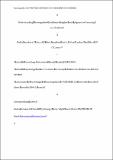Understanding metacognitive confidence : insights from judgment-of-learning justifications
Abstract
This study employed the delayed judgment-of-learning (JOL) paradigm to investigate the content of metacognitive judgments; after studying cue-target word-pairs, participants predicted their ability to remember targets on a future memory test (cued recognition in Experiments 1 and 2 and cued recall in Experiment 3). In Experiment 1 and the confidence JOL group of Experiment 3, participants used a commonly employed 6-point numeric confidence JOL scale (0–20–40–60–80–100%). In Experiment 2 and the binary JOL group of Experiment 3 participants first made a binary yes/no JOL prediction followed by a 3-point verbal confidence judgment (sure-maybe-guess). In all experiments, on a subset of trials, participants gave a written justification of why they gave that specific JOL response. We used natural language processing techniques (latent semantic analysis and word frequency [n-gram] analysis) to characterize the content of the written justifications and to capture what types of evidence evaluation uniquely separate one JOL response type from others. We also used a machine learning classification algorithm (support vector machine [SVM]) to quantify the extent to which any two JOL responses differed from each other. We found that: (i) participants can justify and explain their JOLs; (ii) these justifications reference cue familiarity and target accessibility and so are particularly consistent with the two-stage metacognitive model; and (iii) JOL confidence judgements do not correspond to yes/no responses in the manner typically assumed within the literature (i.e. 0–40% interpreted as no predictions).
Citation
Jersakova , R , Allan , R , Booth , J , Souchay , C & O'Connor , A R 2017 , ' Understanding metacognitive confidence : insights from judgment-of-learning justifications ' , Journal of Memory and Language , vol. 97 , pp. 187-207 . https://doi.org/10.1016/j.jml.2017.08.002
Publication
Journal of Memory and Language
Status
Peer reviewed
ISSN
0749-596XType
Journal article
Description
This research was supported by the Economic and Social Research Council Studentship awarded to Radka Jersakova [ES/J500215/1].Collections
Items in the St Andrews Research Repository are protected by copyright, with all rights reserved, unless otherwise indicated.

